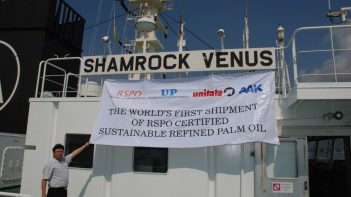The Roundtable on Sustainable Palm Oil (RSPO) has laid out ambitious goals to transform the global market to make sustainable palm oil the norm. But this vision can only be achieved if the markets in the developing economies also contribute to the global market transformation. What is the progress in China?
“The big idea behind the theme is that while we have a shared global vision on sustainable palm oil, we need to set regional objectives for market uptake to reach 100% CSPO in Europe, 50% in Indonesia and Malaysia, 30% in India and 10% in China by 2020,” explains Datuk Darrel Webber, Chief Executive Officer of the RSPO.
While major progress in the uptake of Certified Sustainable Palm Oil (CSPO) uptake has been made in Europe, in China–the third largest importer of palm oil–the uptake of CSPO remains low. This is why RSPO’s vision for China is to achieve 10% CSPO uptake by 2020.
Substantial groundwork already invested
In the past decade or so, several organizations, including RSPO, the China Chamber of Commerce for Import and Export of Foodstuff, Native Produce and Animal By-products (CFNA) and other non-government organisations such as WWF and Solidaridad have promoted sustainable palm oil in China, with much of the effort focusing on awareness rising.
While this has yielded results, as reflected in the fact that 44 Chinese organisations are now members of the RSPO, more concrete action is needed to transform the market in China.
On October 8, 2015, a MoU was signed between China Quality Mark Certification Group Production Certification (better known as CQM-PCC) and RSPO to herald a new collaboration between both parties.
The aim of this collaboration is to establish a cooperation mechanism to jointly explore the local pathways and approaches to implement the RSPO standards in the China market. At the same time, the collaboration will also seek to jointly promote the RSPO certification programmes, Principles & Criteria and best practices in China, such as training, information dissemination, and marketing campaigns among others.
According to LI Tienan, General Manager of CQM-PCC, “CQM-PCC is delighted to partner with RSPO to promote sustainable palm oil standard in China. After years of development, Chinese companies are incorporating the value of sustainable practices into their business models. We are very excited about the prospects this collaboration will bring about, and the potential impact it will have on the sustainability of the palm oil industry.”
On November 17, the Guide for Overseas Investment and Production of Sustainable Palm Oil by Chinese Enterprises was jointly presented by CFNA and the International Forest Investment and Trade (InFIT) project team to the participants of the 13th Annual Roundtable Conference on Sustainable Palm Oil (RT) for a session of public consultation.
The draft guide for production of sustainable palm oil is a very important step to make a positive contribution in the Chinese market. It helps with the development and implementation of the Guidelines for sustainable palm oil in China, ensuring sustainable production of sustainable palm oil by Chinese investments overseas, and thus promoting trade and consumption of CSPO in China.
“This year’s RT13 was a huge success. We are seeing a lot of positive momentum amongst producers and in the markets, including now China where they are implementing guidelines for sustainable palm oil and the China-UK bilateral collaboration in promoting trade and consumption of CSPO in China. So finally China has moved from being a distant challenge, to being a part of the solution,” said Datuk Darrel Webber.
Click here if you wish to go to the PUBLIC CONSULTATION: GUIDE FOR OVERSEAS INVESTMENT AND PRODUCTION OF SUSTAINABLE PALM OIL BY CHINESE ENTERPRISES page.
Keep reading

RSPO hosts first Africa downstream sustainable palm oil supply chain forum in Cape Town

Nearly two decades on, Europe continues to drive global demand for RSPO Certified Palm Oil

Communicating Sustainable Palm Oil - examples of success across Europe
[EOT] Terms of Reference: Independent Smallholders Outreach Programme in Indonesia

RT2023 Delegates Propose Solutions to Reinforce RSPO’s Assurance System – End-Year Highlights of Assurance Standing Committee
RSPO UK Members' Day Examines Shifting Dynamics of Doing Business within Europe

Celebrating 20 Years of RSPO’s Sustainability Journey




